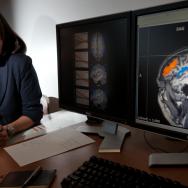Students who physically experience scientific concepts understand them more deeply and score better on science tests, according to a new UChicago-led study.
Brain scans showed that students who took a hands-on approach to learning had activation in sensory and motor-related parts of the brain when they later thought about concepts such as angular momentum and torque. Activation of these brain areas was associated with better quiz performance by college physics students who participated in the research.
The study, published online April 24 in Psychological Science, comes from the Department of Psychology’s Human Performance Lab, directed by Prof. Sian Beilock, an internationally known expert on the mind–body connection and author of the book How the Body Knows Its Mind.
Beilock and her co-authors, Prof. Susan Fischer at DePaul University, UChicago graduate student Carly Kontra and postdoctoral scholar Dan Lyons, explain that hands-on experiences may benefit students more than previously realized, particularly in the world of virtual laboratories and online learning, This may be especially true for the initial stages of learning and in areas of science education that lend themselves to physical experiences.
“This gives new meaning to the idea of learning,” said Beilock. “When we’re thinking about math or physics, getting students to actually physically experience some of the concepts they’re learning about changes how they process the information, which could lead to better performance on a test.”
The study included experiments in the laboratory involving student behavior and brain imaging and one randomized trial in a college physics classroom. The hands-on studies used a system of two bicycle wheels that spun independently on a single axle, which allowed students to understand the concept of angular momentum—at work when a moving bicycle appears more stable than a stationary one. To experience angular momentum, students held the wheels by the axle and were instructed to tilt the axle from horizontal to vertical, while attempting to keep a laser pointer on a target line on the wall. When the axle tilted, the students experienced torque—the resistive force that causes objects to rotate.
The students were divided into groups, with some of the students tilting a set of bicycle wheel, while the other group simply observed. A post-test showed that those who had actively participated in the experiment outperformed the observation group.
The researchers used functional magnetic resonance imaging to see what regions of the brain were activated when students reasoned through the concepts of angular momentum and torque. While in the brain scanner, the students looked at animated pictures of an avatar spinning bicycle wheels—similar to the wheels they spun or watched other students spin. Later students took a quiz on the material.
“When students have a physical experience moving the wheels, they are more likely to activate sensory and motor areas of the brain when they are later thinking about the science concepts they learned about,” said Beilock. “These sensory and motor-related brain areas are known to be important for our ability to make sense of forces, angles and trajectories.
“Those students who physically experience difficult science concepts learn them better, perform better in class and on quizzes the next day, and the effect seems to play out weeks later, as well,” Beilock added.
A final experiment took place in a college-level physics class, to study whether the benefits of action experience could be seen on quizzes and homework taken days later. Students were randomly assigned to either the action or observation roles. Overall, the action group earned quiz grades that were about 7 percent higher than the observation group, even though they had fairly matched grades on other quizzes during the quarter.
For Beilock, the findings stressed the importance of classroom practices that physically engage students in the learning process, especially for math and science.
“In many situations, when we allow our bodies to become part of the learning process, we understand better,” Beilock said. “Reading about a concept in a textbook or even seeing a demonstration in class is not the same as physically experiencing what you are learning about. We need to rethink how we are teaching math and science because our actions matter for how and what we learn.”
